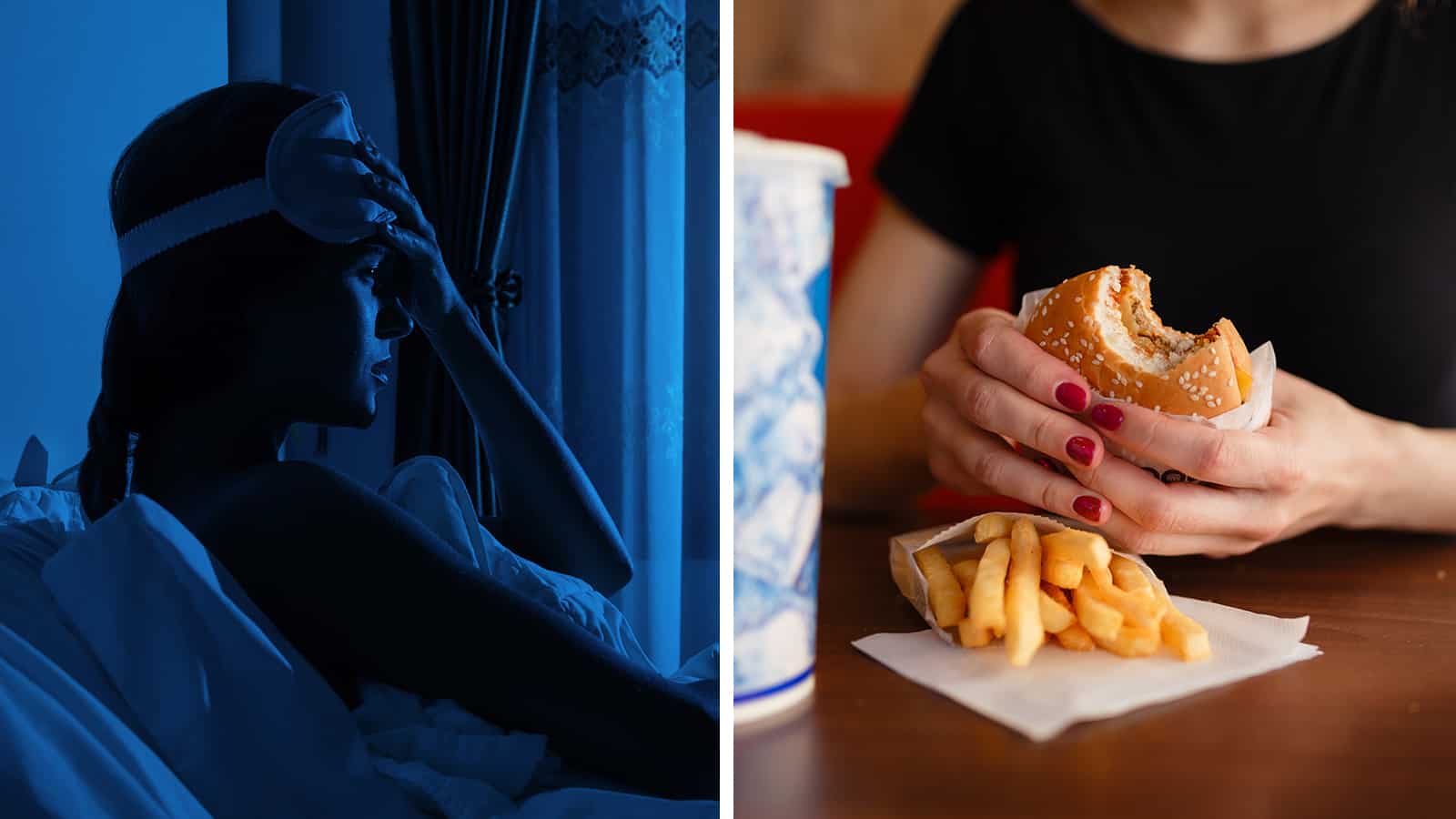Have you been feeling tired every day? Does your sleep feel lackluster? Do you rarely ever feel rested, even when you think you’ve slept enough? Poor sleep is far from an uncommon problem in today’s world. With all the hustle and bustle of modern life, you may feel too busy to maintain a healthy sleep schedule. But the culprit might be surprising–making unhealthy food choices.
So let’s shift the focus to your diet. What are the most common foods that you reach for? Do you tend to make bad choices when it comes to picking meals and snacks? Do you often give in to cravings or break your dietary promises? Are you starting to see physical signs of your unhealthy food habits in your weight and energy levels? Again, this isn’t uncommon – the world is full of attractive and delicious but ultimately poor food options!
But did you know that those two problems are closely linked? In fact, they directly affect each other and might be perpetuating your worst habits in both areas. Having an issue with one often means you’re going to have a problem with the other. And on top of that, they’re both dampening your physical wellbeing, positive thinking, daily performance, and overall energy! So, what’s the connection between poor sleep and unhealthy food choices?
1. Poor Sleep And How It Influences Unhealthy Food Choices
Your body tells you when it’s hungry based on the energy levels that it has. In turn, those levels are affected by multiple factors, at the center of which is sleep and rest. Sleep is crucial for the body’s function, giving it the chance to restore itself and recover from the day.
When you don’t get enough sleep, your body craves more energy and constantly feels hungry throughout the day. It needs a way to keep itself going and often turns to poor dietary choices, such as the following:
· High-Calorie Preferences
To supply yourself with energy when you’re tired from inadequate sleep, your body demands more calories, say studies. You will naturally gravitate towards options like junk food and fast food, packed with loads of calories. These foods lack the nutrients that would help you get through the day, but they’re most appealing to your tired mind. The fact that they’re awful for your mental and physical health certainly doesn’t help your case, either!
· Increased Total Consumption
As previously mentioned, your body demands any source of energy when it’s tired. According to research, this can lead to eating a lot more at more frequent rates throughout the day. Unfortunately, the excess consumption that occurs happens without notable physical activity changes. You’re too tired to exercise and are likely to be even more sedentary after poor sleep. As such, eating more is an unwise option, but your body will keep screaming that it’s hungry!
· Sugar Cravings
Glucose is a convenient fuel source for the body, and you can get it most quickly from sugar. This is why when you’re exhausted, you’re likely to want to eat all sorts of unhealthy sweet treats. Studies show that these cravings also occur among those with poor sleep quality, not just a general lack of sleep. When it’s that tired, your body wants a simple and direct source of fast energy – even though that will likely make it even more sluggish!
However, the influences that poor sleep can have on your diet don’t just stop at a few junk food cravings. In the long run, continually not getting enough sleep or poor-quality sleep will cause physical bodily changes. These changes are all related to your diet. While not inherently harmful to all people, they indicate the links between poor sleep and dietary habits. The changes above include these:
- A larger waist circumference, according to research.
- Greater risk of obesity, according to studies; the converse effect is not noted with longer sleep.
- Studies show decreased heart health due to a mix of the effects of poor sleep and the resulting poor nutrition.
- Decreased positive thinking, which can cause you .to eat or stress eat emotionally
There is also a common misconception that a lack of sleep somehow correlates to losing weight. This is likely due to inaccurate assumptions of laziness placed on overweight individuals. Those assumptions could make someone believe that someone who sleeps a lot is lazy and may gain weight.
This is a complete myth! The reality is that research shows that getting enough sleep is the best way to achieve a weight loss goal. Those who seek to lose weight always see the most results when they can get the rest that they need. Honestly, that should go without saying; healthy habits beget health. So don’t deny yourself and your body much-needed sleep because of these false assumptions!
2. Unhealthy Food Choices And How They Influence Your Sleep
You know how poor sleep can wreak havoc on the way you choose the food you eat. But did you know it also happens the other way around, too? Unhealthy food options tend to cause you to feel more tired and sluggish. This is because they don’t provide you with the fuel and nutrients that your body truly needs.
And yet, despite all the drowsiness that poor food choices get you, you’re still not going to be able to sleep well that night! That’s because choosing unhealthy foods comes with its laundry list of problems that can all ruin your rest. Here are some notable links between diet and sleep:
· Micronutrient Inadequacy Worsens Sleep
To gain good sleep, it is necessary to have all your essential nutrients. But it’s not just the big food groups that you have to be aware of – it’s micronutrients, too. This involves components like magnesium, calcium, and vitamins A through K, according to research. A lack of those vitamins and minerals has been linked to different sleep issues. It is theorized that this is due to how these nutrients can affect certain hormonal pathways, especially ones for sleep.
· Salt Disrupts Sleep
Salty foods can contribute to a risk of “superficial” sleep, which means sleep without restorative phases. This means that if you eat too much salty food, you can sleep for eight hours and still feel exhausted in the morning! This is according to research, which also suggests that salt’s effects on hormones are to blame. In addition, diets low in salt (and saturated fats) designed to aid blood pressure are even better for sleep health! The DASH diet is explicitly well-known for providing positive effects on rest to those who closely follow it.
· High-GI Carbs Affect Deep Sleep
A glycemic index (GI) refers to how much a food boosts the blood sugar levels in your body. The spikes in blood glucose are typically associated with a lack of healthy food choices. If you’ve noticed that meals featuring processed carbs tend to make you sleepy, that’s because of the high GI. Ironically, all that drowsiness makes your sleep worse! While carbohydrates are essential for your health, high-GI carbs are decidedly less ideal. Studies show that they can reduce the total amount of time you spend in deep sleep. They then further impair the quality of your sleep by increasing your nighttime wake-ups – which also interrupts deep sleep!
· A Poor Diet Can Cause Sleep Disorders
Obstructive sleep apnea is a severe disorder that causes your breathing to become impaired when you sleep. It usually leads to a lot of waking up at night, which naturally reduces the restorative sleep you can achieve. Bad dietary choices are among the risk factors for this disorder, especially since they can also lead to obesity.
3. Improving Your Sleep By Skipping Those Unhealthy Food Choices
You’ve probably figured out by now that poor sleep and unhealthy food choices can support each other in a terrible cycle. The poorer your sleep, the less healthily you eat. The less healthily you eat, the poorer you sleep. It can be a mess to be caught in that spiral!
That’s why you need to take the first step in breaking this trend by working to improve both your nutrition and sleep. The good news is that many things that help your sleep will also help you make wiser food decisions. As such, here are some tips for improving sleep quality.
- Ensure a comfortable sleeping environment. The room where you sleep should be dark and at a cool temperature every night. Try to reduce the amount of noise that gets to that room, too.
- Maintain a regular sleep schedule, waking and sleeping at the same time every day. This will allow your brain to regulate its sleep-wake cycle. Before long, you’ll be able to fall asleep quickly and wake up refreshed.
- Don’t drink too much alcohol or coffee. Both of these drinks can disrupt your deep sleep, making you more tired in the morning.
How To Choose Healthier Foods:
In a similar vein, here are some tips for improving your food choices:
- Plan and prepare meals in advance. Choose one or two days a week to cook large batches of food that can sustain you for the week. When you have healthy options on hand, unhealthy ones are less interesting.
- Start very closely reading all the labels on food packaging, scrutinizing the nutritional information panel. Choose foods that are low in saturated fats, salts, and sugars.
- Add filling foods like fibers, proteins, and healthy fats to your diet. They will help to keep you feeling sated, so you don’t feel hungry again so quickly.
- Buy or prepare healthy snacks that you can bring along with you instead of stopping at a shop when you’re peckish. Even bringing fruit is a great idea!
Final Thoughts On The Connection Between Poor Sleep And Unhealthy Food Choices
The food that you eat and the way you choose to sleep are both personal lifestyle habits. It’s ultimately up to you how you maintain a sleep schedule. And it’s your choice what you eat, too. Even if they’re unhealthy, these decisions don’t reflect poorly on your value as a person. But they do reflect poorly on your health, and they can cause many problems for your wellbeing down the line.
If you struggle with making unhealthy food choices, you can speak to a doctor or registered dietician for advice. A doctor or relevant health professional can also provide aid if you struggle with sleep. Their help and your efforts to improve will allow you to make the connection between diet and food a positive one!

















 Community
Community

